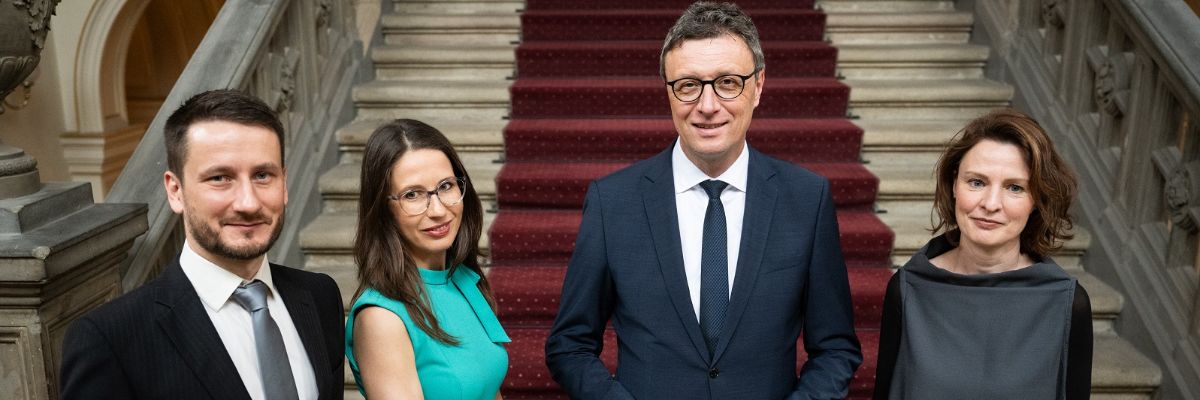
The nanoworld of molecules and future electronics: Two Dioscuri Centers open
21. 05. 2024
The Czech Republic is the second country after Poland to establish Dioscuri Centers of Scientific Excellence, initiated by the Max Planck Society. Two will be based at the Institute of Physics of the Czech Academy of Sciences, established by spin caloritronics expert Helena Reichlová and nano-optics specialist Barbora Špačková. The third center will be hosted by Masaryk University in Brno, led by developmental biologist Peter Fabian. The opening ceremony of the Dioscuri Centers took place on 17 May 2024 at the CAS headquarters, attended by leading representatives of the Max Planck Society, the CAS, and the German and Czech Ministries of Education.
The Dioscuri program guarantees scientists autonomy and flexibility, extensive scientific freedom, and a connection to international research networks. It primarily targets outstanding early-career researchers with international experience.
“If you want to achieve great results in science, you have to take on different points of view, and this involves changing environments,” Patrick Cramer, President of the Max Planck Society, points out, emphasizing the importance of international experience for researchers. The European Union strongly supports research mobility, especially in Central and Eastern Europe. “However, even twenty years after its expansion, excellence in research is not evenly distributed within the European Research Area,” Cramer adds, noting that the Dioscuri program is one of the tools aimed at balancing conditions for research across different regions.
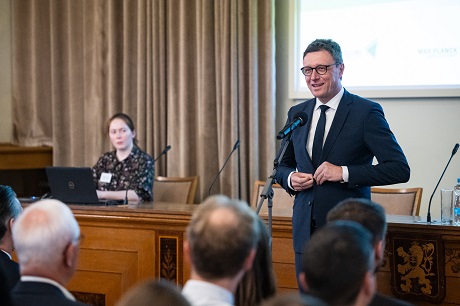
“In recent decades, science has greatly benefitted from the possibilities that Europe offers. Mobility is a striking example, funding opportunities are another,” Max Planck President Patrick Cramer says.
A peek into molecules
Nano-optics specialist Barbora Špačková plans to open her Center for Single-Molecule Optics on 1 July 2024. Its goal will be to develop a set of tools for studying life at the molecular level. She highly values her involvement in the Dioscuri program. “It is undoubtedly a huge opportunity. The grant conditions are incredibly generous and provide substantial freedom. I will use the funds primarily to establish my own team, and with the support of my home institute, we will also set up new laboratories,” the researcher says.
After studying at Czech Technical University in Prague and working at the Institute of Photonics and Electronics of the CAS, Špačková continued her scientific career at Chalmers University of Technology in Sweden. Thanks to a Marie Skłodowska-Curie postdoctoral fellowship, she returned to the Czech Republic in 2022 to join the Institute of Physics of the CAS.
“I deal with nano-optics, which focuses on looking at very small things. At the Dioscuri Center, we will examine life at the molecular level, biomolecular processes, and molecular transport, and we want to concentrate on biomedical applications,” Špačková explains.
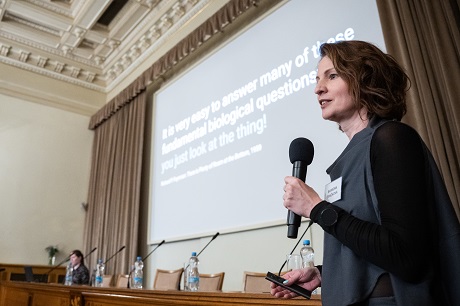
Barbora Špačková from the Institute of Physics of the CAS.
Electronics of the future
Helena Reichlová leads the Dioscuri Center for Spin Caloritronics and Magnonics. These complex terms cover two groups of effects aimed at addressing the increasing energy demands of information technologies. “The amount of information and data is growing exponentially, as is the energy demand of information technologies, which is an issue that needs to be addressed,” the researcher notes.
One approach is to discover new principles for transmitting and processing information, such as using waves of the electrons’ spins, known as magnons. “A spin wave can be used to transfer information instead of the currently used moving electrons. If we need to transfer information from point A to point B, then, the electron can stay in place and transmit information by tilting its spin in a controlled manner,” Reichlová explains.
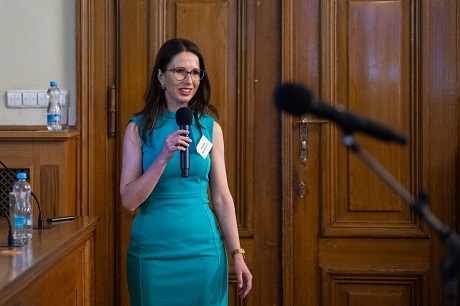
Helena Reichlová from the Institute of Physics of the CAS.
After studying at the Faculty of Mathematics and Physics at Charles University in Prague, Reichlová spent part of her PhD studies at Ohio State University, afterwards working for five years in Dresden. In 2022, she returned to the Czech Republic and joined the Institute of Physics of the CAS. She opened the Dioscuri Center in October 2023.
You can read more about Helena Reichlová’s research in our interview with her, initially published in Czech in the A / Magazine of the CAS.
Fighting metabolic diseases
Peter Fabian, head of the Dioscuri Center for Stem Cell Biology and Metabolic Diseases, and his research group want to study hereditary diseases in humans using animal models (primarily zebrafish).
“It might sound a bit strange, but humans and zebrafish share seventy percent of the same genes. More than eighty percent of human genes known to be associated with human diseases have counterparts in the zebrafish. We share not only genes, but also all primary tissues and organs,” Fabian explains. His Dioscuri Center is being established at Masaryk University in Brno, where the researcher has been working since 2022. Before that, he spent five years on a postdoctoral fellowship at the University of Southern California.
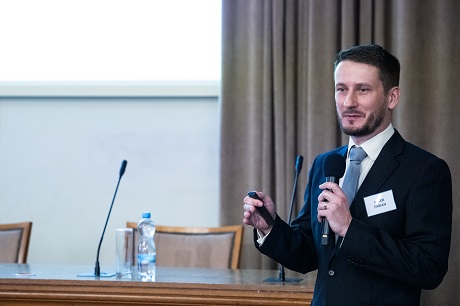
Peter Fabian from the Masaryk University in Brno.
Czech Republic – an attractive destination for scientists
Helena Reichlová, Barbora Špačková, and Peter Fabian succeeded with their projects in the first call of the Dioscuri program, competing against 30 other candidates. The selection committee selected from a highly diverse set of applications. More than half of the applicants were not born in the Czech Republic, and nearly a third had no previous connection to the country.
These numbers suggest that the Czech Republic is becoming a relatively attractive place for the international research community. The Dioscuri program also benefits from the good reputation of the Max Planck Society, which employs proven and innovative strategies to support young researchers on their path to scientific excellence and independence.
In the coming years, up to five Dioscuri Centers of scientific excellence will be established at host institutions in the Czech Republic. The centers will be funded with 1.5 million euros for a period of five years, with the expenses shared by the German Federal Ministry of Education and Research and the Czech Ministry of Education, Youth and Sports. The host institutions (in this case, the Institute of Physics of the CAS and Masaryk University) provide the necessary research facilities and additional financial resources, offering the center directors long-term prospects.
Written and prepared by: Leona Matušková, External Relations Division, CAO of the CAS
Translated by: Tereza Novická, External Relations Division, CAO of the CAS
Photo: René Volfík for the Institute of Physics of the CAS
Read also
- PHOTO STORY: The invasive black bullhead catfish threatens Czech fishponds
- Rewrite the textbooks – we’ve found a bone; aka When science takes a wild turn
- CAS researchers receive L’Oréal-UNESCO Award and Forbes recognition
- Young scientists discussed economic challenges with Nobel laureates in Lindau
- A cure for cancer? Fighting the climate crisis? Ask the data scientists
- Vice-Presidents of the CAS set priorities for 2025–2029 term
- Public Hearing: “Making Sense of Open Science”
- SUNER-C concludes after three years dedicated to the renewable energy future
- A trapped state: The pandemic impact on public attitudes, trust, and behavior
- Aerial archaeology: Tracing the footsteps of our ancestors from the sky
The Czech Academy of Sciences (the CAS)
The mission of the CAS
The primary mission of the CAS is to conduct research in a broad spectrum of natural, technical and social sciences as well as humanities. This research aims to advance progress of scientific knowledge at the international level, considering, however, the specific needs of the Czech society and the national culture.
President of the CAS
Prof. Eva Zažímalová has started her second term of office in May 2021. She is a respected scientist, and a Professor of Plant Anatomy and Physiology.
She is also a part of GCSA of the EU.